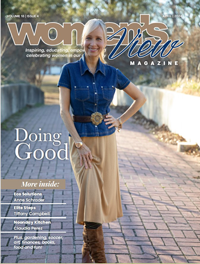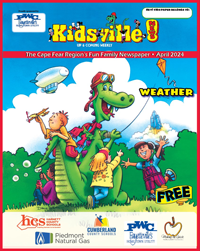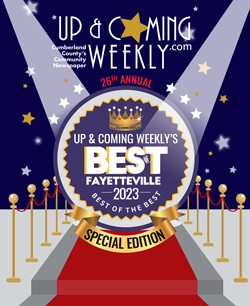- Details
-
Tuesday, 16 April 2024
-
Written by Craig Stewart
 Publisher’s Note:
Publisher’s Note:
I’m yielding my editorial space to publish a Letter to the Editor we received from a Fayetteville resident who addresses a major (and common) local safety concern that weighs heavily on the hearts and minds of thousands of Fayetteville residents. I applaud this writer for his bold initiative in attempting to bring his concerns to our city leaders.
It is my hope, that this letter will inspire and motivate others to get involved by voicing their opinions and sharing their experiences with elected officials. This is the ultimate way to effect change. Thank you for reading the Up & Coming Weekly community newspaper.
— Bill Bowman
I went to the April 3rd meeting of Fayetteville City’s Council Community Safety Committee to voice my complaints over speeders with their ear-piercing, unmuffled cars and motorcycles. I never knew we had such a committee until I was directed there by the 911 operator.
I came prepared with a speech and expected to see many more like-minded concerned citizens present, but I was the only non-committee member there. Maybe not too many people know about this resource. Interesting.
I was cordially greeted and asked the nature of my presence. I told them my intentions and gave the Chairman of the Committee, Council Member Mario Benavente, a copy of my presentation since I would not be allowed to present it. He said the first step for concerns like mine begins with my District Five representative, Lynne Greene.
He took my contact information, and I showed myself out. This is my speech to the committee:
Fayetteville police do not rule the streets. They are overwhelmed by speeders with their ear-piercing, unmuffled cars and motorcycles. The lack of police cars with radar is only part of the problem. In my opinion, the will to enforce the law is also lacking. (At this point, I was going to relate my personal experience.)
My wife and I were waiting to turn left from S. McPherson Church Road onto Raeford Road when a speeder ran through the red light just before I was about to turn.
I looked up and saw a police car sitting at the BP station facing the intersection. Both my wife and I said at the same time, "Look at that!". I made the turn, and my wife said, "You go over there to that policeman and ask him why he did not go after that car!"
I resisted, but she was insistent. So, I did.
I came up to his window, and he was very nice. He answered me, "I don't have radar."
He also said he was one of only two officers available for the entire area. This incident caused me to question the city's resolve to provide an adequate police force with proper equipment—end of story. My presentation continues.
South McPherson Church Road and the All-American Freeway serve these lawbreakers as their personal Indianapolis 500. Also, misfits draw doughnuts in intersections and parking lots, showing contempt for authorities and private property owners.
You should take it personally and direct more funds to the police force. Without safety and respect for the law, you cannot pursue other projects to improve the city—end of presentation.
The constant blaring of speeding, unmuffled cars, and motorcycles just got too much for me recently, which is why I called 911. This led me to the Community Safety Committee on where I received their meeting agenda and the minutes of their last meeting on March 6, 2024.
I then focused on one agenda item and two organizations I was not familiar with:
1. Driving Equality Laws Presentation Recap (agenda item)
2. Emancipate NC (organization)
3. Forward Justice (organization)
Upon reviewing the minutes, I noticed both Emancipate NC and Forward Justice made presentations to the committee, and received general approval with City Council Member Banks-McLaughlin saying there was "great dialogue between Fayetteville Police Chief Braden and Attorney Carpenter" of Forward Justice.
What is Emancipate NC, and who is Forward Justice? Emancipate NC has a website that states, "It is an organization founded on the knowledge that incarceration and structural racism is harmful.
It is an organization dedicated to shifting the narrative on racialized mass incarceration through community mobilization.” They maintain that the mainstream narrative that criminalizes Black and Brown people must be transformed.
The Forward Justice organization is a nonprofit center in Durham, NC, dedicated to advancing racial, social, and economic justice in the South. This group challenges laws, policies, and practices that harm the most vulnerable in society- the Black, Brown, and poor populations, keeping them from full liberation.
You should Google these groups for yourself. They are anti-capitalist (Marxist), anti-police, and anti-law and order. They promote the ideas of systemic governmental racism and racial injustice.
So, why do these organizations have the ear and endorsement of our city council without public knowledge?
Does not the law read the same no matter what race you are? Is there a need for any organization to cheer on one race over another? Justice must be blind no matter what your situation is.
I went to the April 3rd meeting to complain and voice my concerns about noisy, speeding, and contemptible behavior on the roadways. I came away more troubled over what appears to be a bigger problem.
Craig Stewart
Fayetteville, NC 28314
- Details
-
Tuesday, 09 April 2024
-
Written by Pitt Dickey

 Love is a many splintered thing. Time to hop into Mr. Peabody’s Way Back Machine back into the wonderful world of Greek Mythology. Remember our old friend Daphne? If you skipped class the day Daphne was discussed, you are in luck. Daphne was a Naiad. Naiads are beautiful woodland nymphs who hang out around water features like fountains, ponds, and streams.
Love is a many splintered thing. Time to hop into Mr. Peabody’s Way Back Machine back into the wonderful world of Greek Mythology. Remember our old friend Daphne? If you skipped class the day Daphne was discussed, you are in luck. Daphne was a Naiad. Naiads are beautiful woodland nymphs who hang out around water features like fountains, ponds, and streams.
Her Daddy Peneus was a River God. Daphne was minding her own business when as luck would have it, Apollo, the God of poetry and light, got into a ruckus with Eros the God of Love.
Daphne ends up as collateral damage due to the fuss between Apollo and Eros. Pro tip: Eros is now known popularly as Cupid, the God of Love, chocolate, flowers, and men buying the wrong gift for their lady person.
In a win like NC State beating Dook in the NCAA tournament, Apollo had just gotten back into town after whaling the tar out of a substantially mean nasty dragon named Python. Flush with success and arrogant about his victory, Apollo bumped into Eros at the sauna at Mount Olympus. Eros was famous for shooting arrows into mortals to make them fall in love. Apollo trash-talked to Eros, bragging his defeat of Python made Eros’ puny love arrows look silly. This jab did not sit well with Eros who was defensive about his job making people fall in love.
To prove he was not a God to be trifled with, Eros shot a gold tipped arrow into Apollo’s heart making Apollo fall in love with Daphne. To make Apollo’s life miserable (and incidentally Daphne’s life as well), Eros shot a lead-tipped arrow into Daphne which made her want to avoid men at all costs.
The lead-tipped arrow had the same effect on Daphne that Suboxone has on heroin addicts. Gentle Reader, you can see where this is going. The late great Possum, country superstar George Jones, sang about this very situation in his song “The Race is On”: “Now the race is on/ And here comes pride up the backstretch/ Heartache’s a-going to the inside/ My tears are holding back/ Trying not to fall/ … My heart’s out of the running/ The race is on/ And the winner loses all.”
Apollo was smitten with Daphne as only a God injected with a golden arrowhead could be smitten. Like Ernest T. Bass’ unrequited love for the beautiful Rowena, like Running Bear loved Little White Dove with a love as big as the sky; Apollo loved Daphne with a love that could not die. Apollo became Daphne’s stalker.
He begged and pleaded with her to no avail. The lead arrow turned Daphne off to all men. Another dude, Leucippus, was so taken with Daphne that he disguised himself as a woman to get close to her. Like Tony Curtis and Marilyn Monroe in “Some Like it Hot,” Leucippus became Daphne’s best friend while disguised as a woman. Their closeness grossly aggravated Apollo.
Being a God, he caused Daphne and her merry band of nymphs to decide to go swimming in a river. This was before bathing suits were invented. Everyone had to strip down nekkid to take a dip. When Leucippus had to undress, his shortcomings as a woman were revealed to the nymphs. They did not take kindly to being fooled and stabbed him to death.
Apollo’s pursuit of Daphne resumed unabated. Apollo’s unwanted persistence foreshadowed Sting’s hymn to stalking “Every Breath You Take”: “…Every breath you take/ And every move you make/ Every bond you break/ Every step you take/ I’ll be watching you.” Finally, exhausted by Apollo’s advances, about to be kissed, and backed into a proverbial corner, Daphne called on her father Peneus to save her from Apollo.
Dear old Dad did what any loving father would do to save his daughter. Peneus turned Daphne into a laurel tree. The transformation was complete. Her hair turned into leaves, her skin turned into bark, her feet became roots, and her face turned into the canopy of the tree. She was no more.
Even Daphne’s treemongrification did not quench Apollo’s ardor. Apollo became the first tree hugger. Apollo could feel Daphne’s heart beating while he hugged her tree. Apollo is reported to say: “My bride since you can never be, at least, sweet laurel, you shall be my tree. My lure, my locks, my quiver you shall wreathe.” His pledge of love is almost as sweet as when Andy Griffith sang: “Sure as the vine twines ‘round the stump/ You are my darlin’ sugar lump.”
Apollo was so taken with laurel trees that he used laurel leaves to crown the winners of the early Olympics. This habit caught on. That is why laurel leaves are awarded as prizes to winners of various contests to this day.
As Paul Harvey used to say: “Now you know the rest of the story.” So go rest on your laurels.

 For generations, we worried about overpopulation around the world, but, increasingly, we are now more worried about too few babies arriving in the United States and in many other developed nations.
For generations, we worried about overpopulation around the world, but, increasingly, we are now more worried about too few babies arriving in the United States and in many other developed nations. 
 How to resolve AdBlock issue?
How to resolve AdBlock issue? 













